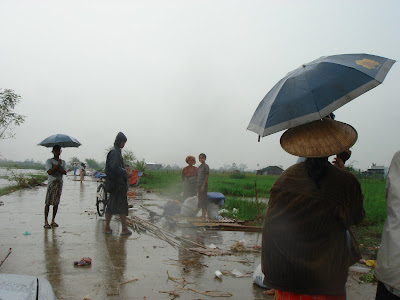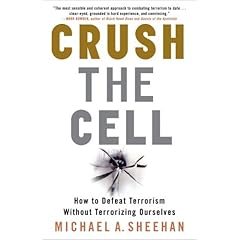 UPDATE: Exclusive photos from Burma that accompany this story have been posted here.
UPDATE: Exclusive photos from Burma that accompany this story have been posted here. Friday I spoke with a journalist who had recently returned from the Irrawaddy Delta. Talking with Tobias Grote-Beverborg of Germany's
Deutsche Welle, I learned something new and disturbing concerning the Cyclone ravaged region of Burma.
First, some background. The information he supplied directly relates to a recent report by
Amnesty International. News media reports -- like
this one from the CBC -- informed us of the finding of the
Amnesty report:
The human rights organization said that since May 19, there have been 30 confirmed reports of people being forcibly removed from places of refuge in Rangoon and the northern part of the Irrawaddy Delta, one of the areas worst hit by the May 3 storm. Many are being relocated to their homes further south, which were destroyed and are yet to be rebuilt, Amnesty researcher Benjamin Zawacki told the CBC.
What I had not realized until I spoke to Tobias, was that those being relocated were not necessarily being evicted from "camps," but rather,
from their own neighborhoods.The reason you see photos of people lining roads is that the road is often the highest ground in the vicinity of their former homes. So when the army evicts these people from the roadside, the junta is effectively evicting local residents from their own land.

Tobias visited several camps on the outskirts of Rangoon. He showed me truly shocking "before eviction and after" photographs.
"This photo shows what the place looked like before," said Tobias.
Along a road, hundreds of miserable looking Burmese people hunched under makeshift shelters -- blue and orange sheets. To the sides of the road was swamp -- the site of their former village.
"I returned to the village the following day" said Tobias. "But everyone was gone. I was told the army had come early in the morning and forced everyone to clear out."
Tobias showed me another photograph. The same road where hundreds crouched was almost deserted. It was an most disturbing sight.
"The speculation is that a Taiwanese aid group had posted information about its assistance to these people on a website, and seeing this, the government ordered the people out."
Tobias showed me photos that showed jackets donated to victims by the Taiwanese NGO.

I asked Tobias if these villagers were among the thirty sites referred to in the recent
Amnesty International report as having been cleared away. He told me he had doubts that these villagers would have been known by the human rights group.
So what might be the significance of the fact the junta is moving villagers off their own land? First, as I blogged
here, we know that many of those impacted by the cyclone are members of an oppressed ethnic minority. Half the population of the Irrawaddy Delta is comprised of members of the Karen minority group, and we know the Karen have been subjected to violent attacks perpetrated by the military government in the past. As Jotman reader Crisips
commented, the various actions of the junta seem to betray a broader strategic objective of the kleptocrat military government -- something that goes beyond gratuitous cruelty or sheer indifference to suffering.
The information supplied by Tobias reveals that at least one so-called "camp" from which cyclone survivors have been forced to vacate was located adjacent to the site of survivors' destroyed homes. In the vicinity of Rangoon, we can surmise that any farmland belonging to cyclone victims would likely consist of rich fertile soil, valuable for agricultural.

The observation of Tobias might well constitute evidence of premeditated criminal intent by the junta to steal land from farmers. Is this part of a pattern? Further inquiries should provide the answer.
Most ominously, the Irrawaddy Delta increasingly resembles not so much a natural disaster area as a vast crime scene.
____
Reports from the recent trip Tobias Grote-Beverborg made to Burma are available at the
Deutsche Welle website -- see
here (the cyclone camp story),
here and
here. The website
SouthAsia.de is the place to go for English language reports from Tobias and other
DW correspondents based throughout Asia.






































